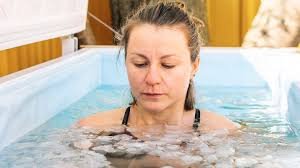Cold Water Therapy To Beat The Heat.
Hello!
Picture this: You are tired and stressed and need some comfort. You walk into your bathroom and submerge yourself in a hot tub, feeling instantly relaxed.
Now imagine ice cubes floating around in your tub. Are you still interested in having a bath? Do you think you will feel instantly relaxed now? I’m sure you’re thinking, why would I expose myself to such an uncomfortable situation when I can take a hot bath filled with Epsom salt and lavender essential oils and delight in a deeply soothing experience?
Hot and cold baths have numerous health benefits, and deliberately dipping into freezing water during a heat wave is rather enticing. It may also provide some surprising benefits.
Cold water therapy involves purposely exposing oneself to water at around 60°F (15°C). Some standard methods are ice baths, cold showers, outdoor swimming in cold water—including polar plunging—and cold water immersion therapy sessions. Cultures around the world have used cold water therapy for thousands of years, and lately, it has become a trend.
Here are some of the potential health benefits supported by current research:
Reduced inflammation: Cold water immersion has been shown to reduce chronic autoimmune inflammation.
Improved insulin sensitivity: A 2023 study found that cold water plunges may protect against insulin resistance and lower diabetes risk.
Muscle recovery: Cold water immersion may help alleviate muscle soreness and inflammation, which is beneficial after intense exercise.
Enhanced circulation: The cold temperature causes blood vessels to constrict and dilate once you exit the cold water, potentially improving overall blood circulation.
Pain relief: Cold exposure may numb nerve endings, relieving temporary pain and reducing discomfort.
Boosted immune system: Some older studies suggest that cold exposure might stimulate the production of immune cells, potentially enhancing immune system function.
Improved mood: A 2023 study suggests that cold exposure may trigger the release of endorphins and other mood-boosting neurotransmitters.
Stress reduction: Cold water therapy may help improve stress regulation.
Increased metabolism: The body's metabolic rate may temporarily increase in response to cold exposure as it maintains a stable core temperature.
It's important to note that while these benefits are promising, some studies have limitations, such as small sample sizes or potential bias, and more research needs to be done. Exposure to extremely cold water can be dangerous, especially if you have circulation issues, high blood pressure, or heart disease. Before trying cold water therapy, it's crucial to consult with a healthcare professional, especially if you have any pre-existing health conditions.
I have never had an ice bath nor jumped in the lake in January. I’m curious, but I doubt it will ever happen. I have tried cold water plunging at therapeutic water spas, swimming in a frigid lake, and regularly finishing my showers with a 1-minute blast of the coldest water I can handle. I do not know if it increases my metabolism or boosts my immunity, but I always feel fantastic after exposure to cold water. I‘m noticeably more energetic and clear-headed, and any anxious or depressive symptoms are eliminated. I sleep well whenever I go for an evening jump in the lake. These late dips have helped me manage my intolerance for super hot days.
If you want to try it, ease in by starting with a cold shower. End your regular shower with the coldest water you can stand for a few seconds, and with each exposure, increase the time and cold temperature.
If you feel brave and want to take an ice bath or go for a polar dip, do your research and consult your doctor.
Let me know in the comments if you ever tried a cold dip.
Stay cool & well.
Anita
Resources
1) Health effects of voluntary exposure to cold water.
DISCLAIMER; The information provided on County Yoga Loft’s website blog is for general health care informational purposes only. All information on the site is provided in good faith. However, it should not replace consultation or advice from a physician and/or other healthcare practitioners. The use or reliance of any information contained on this site is solely at your own risk.



